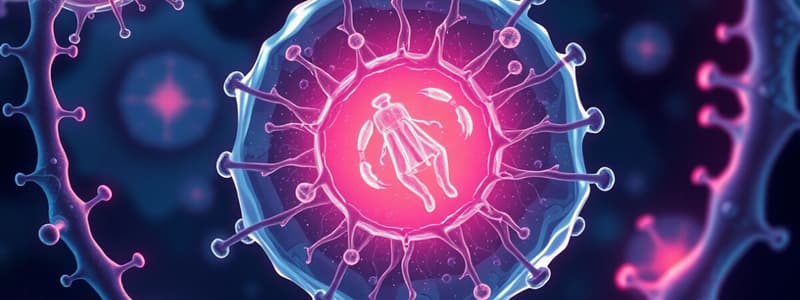Podcast
Questions and Answers
What is the primary function of red blood cells?
What is the primary function of red blood cells?
- Fight infections
- Transmit nerve impulses
- Facilitate movement
- Carry oxygen throughout the body (correct)
White blood cells have a biconcave shape.
White blood cells have a biconcave shape.
False (B)
What specialized structure do sperm cells have to assist in fertilization?
What specialized structure do sperm cells have to assist in fertilization?
A tail
Egg cells contain a chemical change in the membrane that prevents fertilization of more than one _____ .
Egg cells contain a chemical change in the membrane that prevents fertilization of more than one _____ .
Match each specialized cell to its primary function:
Match each specialized cell to its primary function:
What characteristic defines nerve cells?
What characteristic defines nerve cells?
Muscle cells do not contain numerous mitochondria.
Muscle cells do not contain numerous mitochondria.
What is the role of guard cells in plants?
What is the role of guard cells in plants?
Specialized cells undergo _____ to become different types of cells.
Specialized cells undergo _____ to become different types of cells.
The characteristics of the egg cell include:
The characteristics of the egg cell include:
Flashcards are hidden until you start studying
Study Notes
Cell Specialization
- Also referred to as cell differentiation.
- Involves the transformation of generic cells into distinct types for specific functions.
Specialized Cells in Animals
-
Red Blood Cell
- Function: Transports oxygen throughout the body.
- Characteristics: Lacks a nucleus, features a biconcave shape for increased surface area for oxygen absorption.
-
White Blood Cell
- Function: Crucial for the immune system's response to pathogens.
- Characteristics: Irregular shape, capable of producing antibodies to fight infections.
-
Sperm Cell
- Function: Responsible for fertilizing an egg cell.
- Characteristics: Possesses a long tail for swimming, contains numerous mitochondria for energy, and features chemicals at the head to assist in egg cell entry.
-
Egg Cell
- Function: Carries genetic material and contributes to reproduction.
- Characteristics: Large and bulky; membrane undergoes a chemical change to prevent fertilization by multiple sperm cells.
-
Nerve Cell (Neuron)
- Function: Transmits nerve impulses throughout the body.
- Characteristics: Has a long, thin axon and branching dendrites, often myelinated for faster signal transmission.
-
Muscle Cell
- Function: Facilitates bodily movement.
- Characteristics: Elongated and elastic structure, rich in mitochondria to provide energy for contraction.
Specialized Cells in Plants
- Guard Cell
- Function: Regulates the rate of transpiration in plants.
- Characteristics: The cell wall has varying thickness, allowing for controlled opening and closing of stomata.
Studying That Suits You
Use AI to generate personalized quizzes and flashcards to suit your learning preferences.




